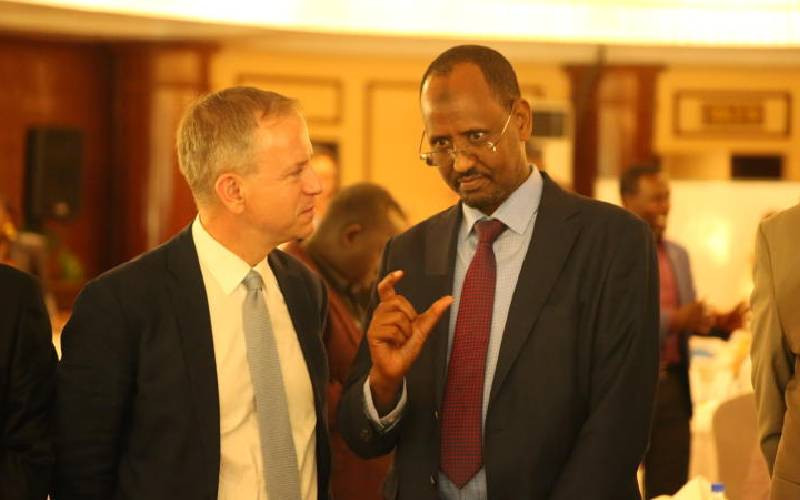
A public-private partnership to end pregnancy and new HIV infections among adolescents has launched a bid to raise USD10.1 million (Sh1.5 billion) for adolescent sexual and reproductive health (ASRH).
This will be achieved through a new Impact Development Bond (IDB) model, where the money will fund the delivery of high-quality, adolescent and youth-friendly sexual and reproductive health services, including HIV testing and treatment to adolescents aged 15 to 19.
The partnership consists of the UN in Kenya and led by the United Nations Population Fund (UNFPA), the United Nations Programme on HIV/AIDS (UNAIDS), the World Health Organisation(WHO), and the SDG Partnership Platform, in collaboration with the Government of Kenya.
Others are a global non-profit organization Triggerise, the Children's Investment Fund Foundation (CIFF) and Bridges Outcomes Partnerships.
Kenya experiences significant challenges with teen pregnancy and new HIV infections among adolescents.
One in six adolescent girls between 15 and 19 years has ever been pregnant. In 2022, an estimated 7,307 new HIV infections occurred among adolescents and young people aged 15 to 24, accounting for 41 per cent of all adult new infections in the country.
Adolescent girls and young women are particularly vulnerable and account for 78 per cent of new HIV infections among adolescents and young people of the same age (National HIV Estimates 2023).
The programme will also focus on challenges such as the lack of information about sexual and reproductive health and rights and inadequate access to services tailored to young people.
It will be implemented in ten counties that experience a significant burden of HIV and adolescent pregnancy including Nairobi, Mombasa, Kisumu, Homa Bay, Bungoma, Migori, Kisii, Nyamira, Kakamega and Busia.
Bridges Outcomes Partnerships will provide upfront funding to Triggerise, a two-year pay-for-success programme supporting over 300,000 vulnerable adolescent girls.
The funding will also go towards the improvement of services in 150 public primary health facilities in the above counties.
The DIB will be implemented using Triggerise’s Tiko mobile-based platform that connects adolescents to nearby public and private facilities offering free services.
It also brings together local actors including networks of health clinics, pharmacies, virtual channels, community-based organisations, and health workers who support youth in their decision-making for the health and wellness services they need to thrive.
Through the platform, Triggerise will be able to track where every cent goes and assess impact every day with real-time reports and data-driven insights.
“Triggerise is an amazing organisation that has been providing access to high-quality adolescent sexual and reproductive health services to girls in Kenya for the last seven years. By supporting them through the development impact bond, we hope to enable them to continue to grow their work in the country so that more girls can take control of their own health and, in doing so, enable them to live happier and healthier lives,” said Bridges Outcomes Partnerships Investment Director Lucia Santirso Richards.
She spoke during the launch of the impact development bond at a Nairobi hotel.
The Ministry of Health will provide the policy direction and overall stewardship of the programme, while the Council of Governors (CoG) will ensure effective coordination of counties.
The 10 County governments involved will be responsible for the provision of SRH and HIV services to vulnerable adolescent girls.
“This innovative programme is quite timely and aligns perfectly with the government’s ambitions of improving the health and wellbeing of the citizenry. It comes at a time when we as a nation are scaling up our efforts to address the challenge of teenage pregnancy, adolescent HIV, GBV and other harmful practices, through a multi-sectoral approach,” said Dr Bashir Issak, Head of the Directorate of Family Health, Ministry of Health.
UN Resident Coordinator Dr Stephen Jackson said for adolescents living in low-income settings, the barriers to access to accurate information and quality sexual and reproductive health services can be challenging to overcome.
‘‘Many are facing financial obstacles, coupled with long distances to health facilities, and other socio-cultural factors that prevent them from this access. Even when services are available, concerns about privacy and service provider bias often discourage adolescents from seeking help. Such issues highlight the urgent need to support adolescents in relation to their sexual and reproductive health and rights,” he said.
The DIB is backed by USD10.1 million(Sh1.5 billion) in outcome funding provided by the Joint SDG Fund and the CIFF.
Once specific outcomes which are linked to improving adolescent health are achieved and independently verified, the upfront funding provided by Bridges Outcomes Partnership will be repaid through outcome funding provided by the Joint SDG Fund and CIFF.
Triggerise and its local delivery partners will have the flexibility to adapt and innovate in order to focus on what is having the greatest impact on the uptake of HIV and SRH services among adolescents.
The ASRH DIB builds on a successful phase one model previously implemented by Triggerise and funded by the Foreign and Commonwealth Development Office (FCDO) with CIFF as the investor, over an 18-month period from 2020 to 2022.
During this first phase, the availability and uptake of SRH services among adolescents in Kenya was expanded, reaching a total of 251,000 girls with 383,000 services, far surpassing the target of 244,445 service visits.